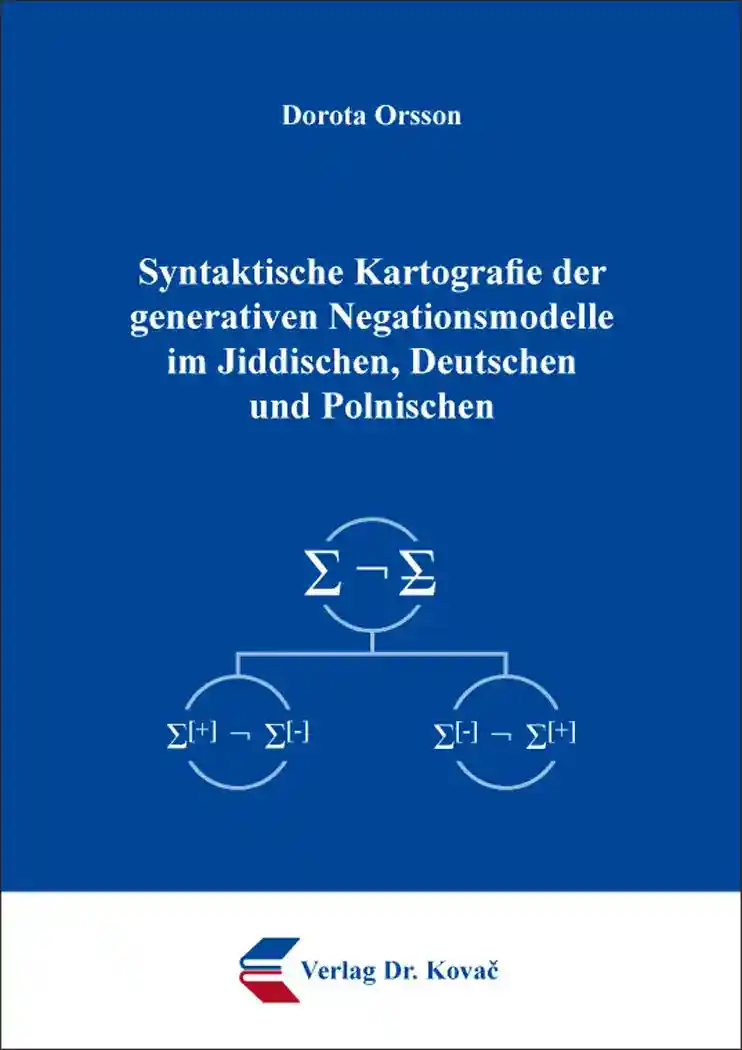Dorota OrssonSyntaktische Kartografie der generativen Negationsmodelle im Jiddischen, Deutschen und Polnischen
Schriften zur Vergleichenden Sprachwissenschaft, volume 29
Hamburg 2020, 162 pages
ISBN 978-3-339-11194-4 (print)
ISBN 978-3-339-11195-1 (eBook)
About this book deutschenglish
The ability to verbalize mental processes is one of the basic competences enabling humans to survive.
Conveying simple and complex language communications, putting thoughts into words, articulating needs and attitudes, disregarding and diversifying are the bases of social existence of an individual.
By confirming, we accept reality. Negating the previously confirmed enables to adopt a diversified attitude. Without the ability to negate we would not be able to define the borders of self-acceptance in a competent way.
The essence of negation competence is the reason for acknowledging its autonomic status among basic utterances determined by the intention of a language communication sender.
The research of negation area was conducted by the use of GG methodology and its interpretation - the Cartography of Syntactic Structures – introduced by the Italian Studies in the 1990s. The main assumption of GG is to explain both the competence of a sender and a receiver of a language communication in the area of forming and reception of sentences of a given language.
The participants of a language communication are able to both form syntactic structures, which have been created by them so far, and understand those which have not been heard by them yet. The process is possible thanks to the genetic ability of an individual to verbalize mental processes on the bases of acquisition and diversifying capacities of grammatical structures which identify all natural languages.
Each language user, free from verbal disfunctions, is capable of assessing prescriptiveness of a given language communication. This ability is conditioned by an assimilated finite number of grammatical rules in the process of language acquisition, which determine the formation of syntactic structures. Apart from the belief, that the number of formed sentences is infinite, it must be stated that, because of a limited but huge number of vocabulary in a given language which comprises a finite number of words, the number of sentences is also finite.
Functional negation in Yiddish, German and Polish is realized by the use of various lexical-syntactic exponents in syntactic structures. Since, as indicated in research works, not only the n-words belong to them, they have been called factors determining negation (DNF). Their positioning and sentence quantification directly affects the process of semantic polarization [+]/[-] of a given utterance.
In this paper, an inventory of determinants negation as well as the types of negation due to the participation and the kinds of determinants have been presented. On the basis of the collected examples from the prescriptive language corpuses of the examined languages, the process of semantic polarization [+]/[-] has been verified.
Negation as a diverse process and used not only for forming negations or modifications of prosodic features of an utterance constitutes a comprehensive research material and as indicated in this dissertation the anomaly of syntactic structures and open questions for which answers are to be searched in the further research process, attest the particularity of this language phenomenon.
